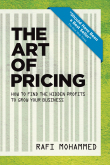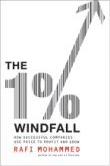What Do Prices for Rock Concerts and Initial Public Offerings Have in Common?
…their prices are often lower than what consumers are willing to pay. For example, on March 19 Visa raised $17.9 billion dollars in the largest U.S. initial public offering (IPO). Visa’s investment bankers set the initial share price at $44 and at the end of the first day of trading, shares closed at $56.50. This closing price meant that Visa’s investment bankers had set a share price that was 28% lower than what the market valued them at, which resulted in over half a billion dollars being left on the table. Similarly, over the weekend I tried to buy tickets to Bruce Springsteen’s upcoming Boston show. Tickets went on sale at 10 AM on ticketmaster.com. By the luck of the Internet draw, I pulled excellent seats. The tickets I paid $100 for are now selling for $600 - $750 each on reseller sites. That’s a lot of missed value.
Just to be clear, I’m not criticizing investment banks or concert promoters for this pricing issue – it’s hard to set prices when value is so unknown/varied and capacity is limited. That said, it’s worth investigating whether new pricing strategies can better capture value. Today, both rock stars and IPOs are starting to use Dutch auctions to price for profit and growth.
WR Hambrecht & Company’s IPO Dutch auction process works as follows: Prior to the initial day of trading, interested investors inform the investment bank about how many shares they want to purchase and what price they are willing to pay. All requests are ordered from high to low price. The share price is then set at the price at which the stock sells out. For example, suppose your company offers 100 shares and three people register to buy: Aaron bids $50 per share and requests 60 shares, Bernie bids $45 and wants 40 shares, and Charlie bids $40 each for 75 shares. The Dutch auction process would set a price of $45 and sell 60 shares to Aaron and 40 shares to Bernie at that price. Since the price he is willing to pay is below $45, Charlie would not receive any shares.
This process allows a company to reap the full value of its shares and reduces the “scalper profit” that share flippers typically reap from IPOs. It does a great job of equating what investors are willing to pay (value) with price. For example, this process was used to set a price of $11.50 per share for the Bank of Internet IPO. The next three days of trading resulted in market prices of $11.50, $11.52, and $11.50. You can’t get much closer to equating price with value.
Mr. Springsteen is using a similar Dutch auction process to sell tickets for a benefit show he is doing for (and at) the 1,500 seat Count Basie Theater in Redbank, NJ. To purchase tickets, fans have to make a credit card guaranteed bid over $1,000. When the auction ends on April 2, all bids will be ordered from highest to lowest. Tickets will then be allocated by bid price – the highest bidders are awarded the best seats.
A Dutch auction forces consumers to reveal their willingness to pay before a sale. This allows companies and rock stars to reap the maximum benefits while minimizing secondary market profits to resellers (i.e., stock flippers and scalpers).




